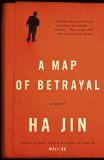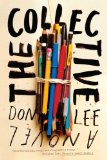Summary | Excerpt | Reviews | Beyond the book | Read-Alikes | Genres & Themes | Author Bio

Ha Jin's imperfect novel has a perfect protagonist. Hero Feng Danlin is everything a journalist ought to be, except when he's not. Let me explain.
Danlin is a thirty-something Chinese expatriate who recently passed his American citizenship test. He's a journalist working for a small New York-based Internet news agency that prides itself on clean reportage and informative content that enlightens readers the world over, even in Mainland China. It's the mid-aughts, George W. Bush is in the White House, and one day Danlin's boss, Kaiming, presents him with a dubious assignment. Danlin's ex-wife Yan Heili has apparently written a novel and he wants the journalist to investigate and review it:
I said, "So what do you want me to do? This is an arts and culture story – I never write about that kind of thing in my column."
"This time you will. This goes beyond books – I believe it's only one piece of a larger scam."
Apparently the book is being promoted by no less than the Chinese government and is supposed to have even been "endorsed by the White House." It's a tough spot since Heili divorced Danlin at a very vulnerable time – one day after his arrival in the US – leaving him with bitter memories. What's more, he never really respected her literary ability in the first place, even when he believed they were happily married. Now she's not only supposedly written a bestseller, but it's being touted as a multinational hit. Of course, he's torn and tries to convince Kaiming that he really shouldn't be the one for this assignment. But in the end he relents, driven as much by craven curiosity as by a desire to keep his job.
When it turns out the novel is nothing more than a pedestrian romance, a cheap bodice ripper that exploits the pain and suffering of those who lost loved ones in the 9/11 attacks on the World Trade Center, Danlin pens a scathing review. His motivations are straightforward. The book – based upon the few chapters he's read – stinks. The publisher's boasts about multinational sales contracts and movie deals are bogus. Haili is a fraud. Of course she takes the criticism personally and responds with vitriol aimed at him personally. The mud flies in all directions. The book's publisher, the Chinese government, and his editor all turn on him. He ends up…uh uh. No spoilers.
What is perfect about Danlin is that he is so committed to the principles that distinguish journalism from propaganda he's willing to sacrifice all. Except that in trying to be impartial he falls into a trap where his personal opinion dangerously compromises those principles. And even as he recognizes this failure, he feels helpless to stifle it because there is a grain of truth in his feelings. Where ought he draw the line? When has he overstepped his values? His strife is palpable, even if self-inflicted, and it ultimately leads to questions of loyalty. And as he argues with a friend about these issues of loyalty to country over loyalty to the state, it becomes unclear if Danlin or Ha Jin is speaking:
And who is the state? Confucius said: "A rapacious government is more destructive than a preying tiger." If we continue to let the state rip us off, we will be eaten up by this insatiable beast sooner or later. Who has raised this animal?...I believe the state should be more like a guard dog than a preying tiger and must be obedient to its citizens.
When I say this is an imperfect novel it is because the plot can get bogged down in lengthy (though thought-provoking) passages of philosophizing. Others have criticized the dialogue as stilted, too stiff. I'm giving that detail a pass because the characters are speaking in English, thus they are not altogether accustomed to the rhythm of their second language. But as a first person narrative of a perhaps too-naive Asian-American man's experience, Ha Jin's eighth novel is a compelling glimpse into the mirror he holds up to the world of 21st Century politics, nationalism and journalism and publishing.
![]() This review was originally published in The BookBrowse Review in November 2016, and has been updated for the
October 2017 edition.
Click here to go to this issue.
This review was originally published in The BookBrowse Review in November 2016, and has been updated for the
October 2017 edition.
Click here to go to this issue.

If you liked The Boat Rocker, try these:

by Ha Jin
Published 2015
From the award-winning author of Waiting and War Trash: a riveting tale of espionage and conflicted loyalties that spans half a century in the entwined histories of two countries—China and the United States—and two families.

by Don Lee
Published 2013
A sparkling bildungsroman about friendship and betrayal, art and race.
Your guide toexceptional books
BookBrowse seeks out and recommends the best in contemporary fiction and nonfiction—books that not only engage and entertain but also deepen our understanding of ourselves and the world around us.